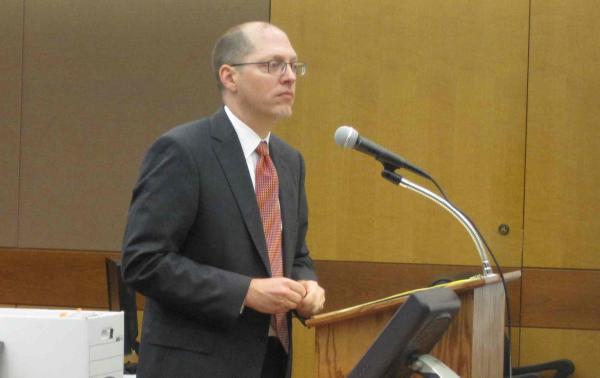Mentally Disabled Warren Hill Wins Stay of Execution

Brian Kammer, Warren Hill's attorney, argues in Fulton County Superior Court today. [David Schick]
A Fulton County Superior Court judge ruled this afternoon in favor of Warren Hill—a mentally disabled man convicted of murder in 1990—granting him an indefinite stay of execution.
Prosecutors said they will appeal the decision. Hill’s execution, which is scheduled for Friday evening, could still take place if the Georgia Supreme Court overturns the ruling.
Judge Gail Tusan agreed with Hill's lawyers that a law dubbed the Lethal Injection Secrecy Act is “unconstitutionally broad” and has the potential to violate Hill’s Eighth Amendment right against cruel and unusual punishment.
The Lethal Injection Secrecy Act, which took effect one day before Hill’s death warrant was issued, protects the confidentiality of the pharmacies that supply the lethal injection drug pentobarbital. State officials say those companies have been threatened by anti-death penalty activists.

Warren Hill. [Georgia Department of Corrections]
Larry Sasich, a doctor who testified for Hill, said he would “bet his life” that the drug was not compounded with acceptable U.S. standards and that there was a great possibility of cross-contamination, putting Hill at risk of the drugs not working effectively.
The state offered up Jacqueline Martin, deputy chief medical examiner for the Georgia Bureau of Investigation, to refute these claims. She says that even if the plaintiff’s claims were true and the drugs were contaminated, Hill would not feel any pain.
“It’s not even necessarily about pentobarbital, it’s about where the ingredients are coming from,” Hill’s attorney, Brian Kammer, said after the ruling.
“Because we were prevented from knowing exactly what compounding pharmacy is manufacturing the drug, where the active ingredients were manufactured, we were basically in the dark and disarmed in terms of making out a claim for relief under the eighth amendment," Kammer said.
Knowing only that the drugs are coming from an out-of-state pharmacy without knowing who they’re coming from “does not inspire confidence” he added.
“Most laws that classify certain information as a state secret allow for declassification and for judicial scrutiny of that information to decide whether, in certain circumstance, it can be disclosed,” he said. Kammer. “What [the judge] is saying is that these claims deserve time to think about more to have, perhaps, some more argument or briefing."
The fate of Hill is still uncertain given the state’s appeal, but if the Georgia Supreme Court doesn’t overrule the injunction before 7 p.m. Friday, when his execution is scheduled, then he’ll make it through another night.
Hill, who is mentally disabled, was convicted of murdering his 18-year-old girlfriend 23 years ago. A federal appeals court rejected his appeal based on his mental retardation in April, and his execution was set for Monday before winning a last-minute stay so today's hearing could be scheduled.











comments